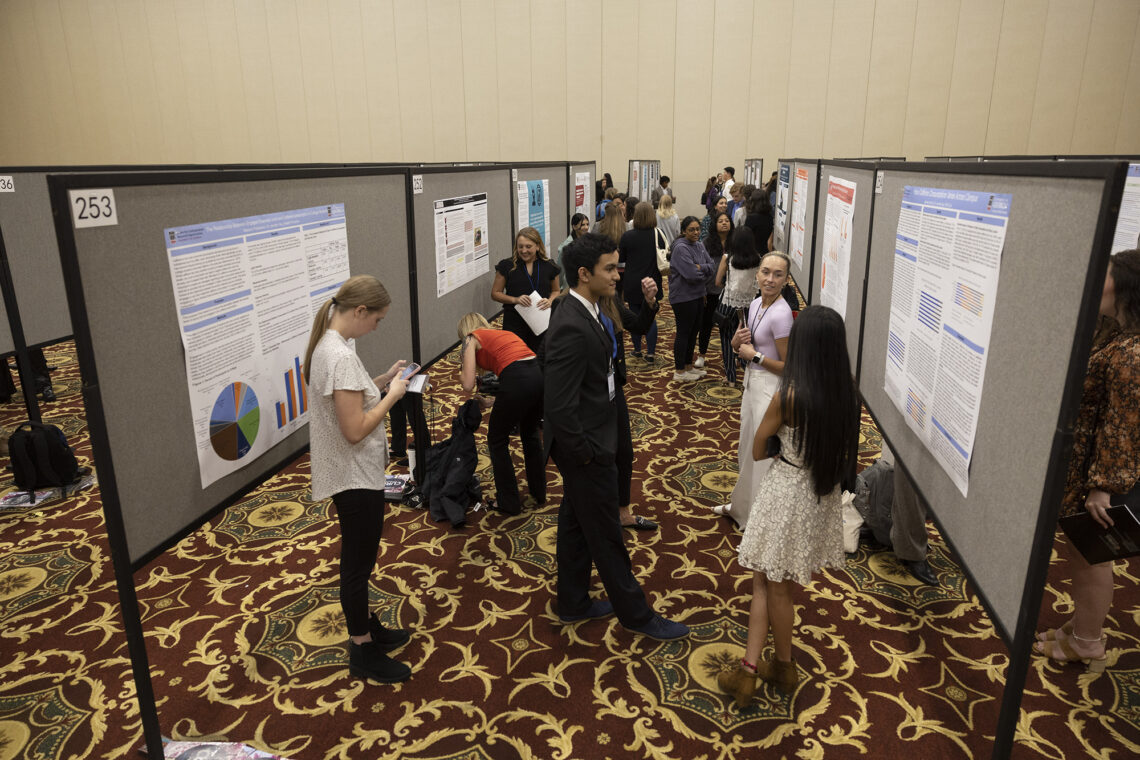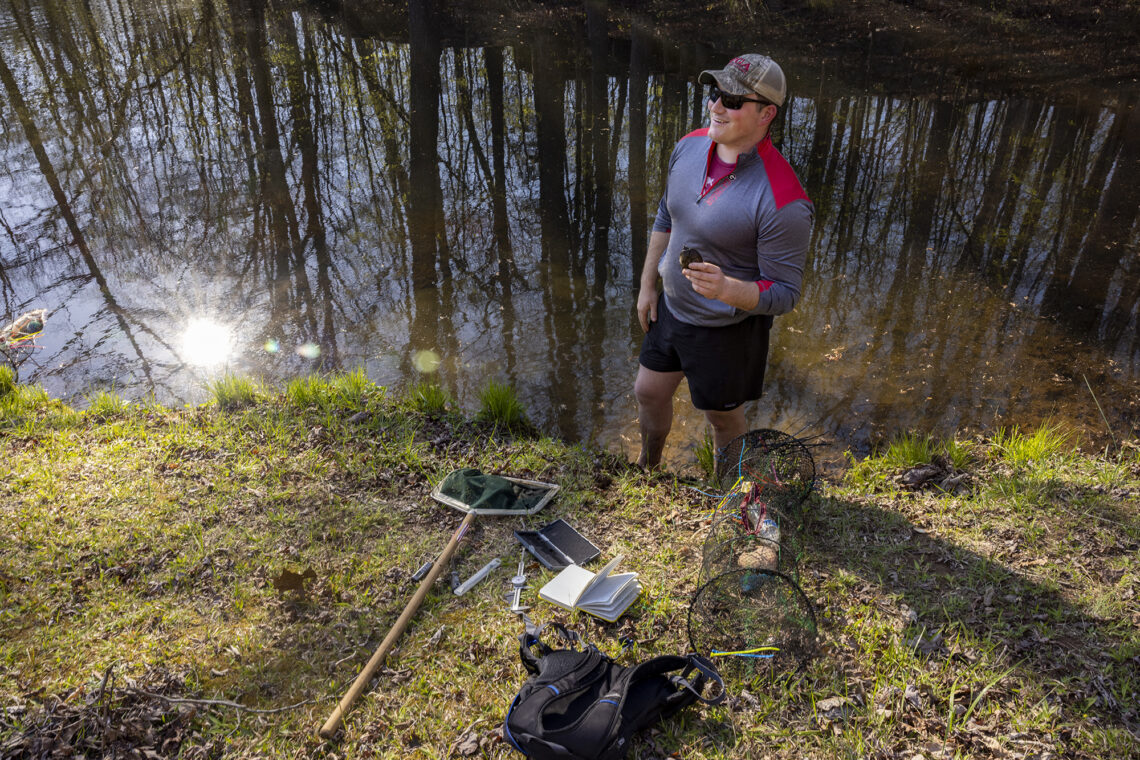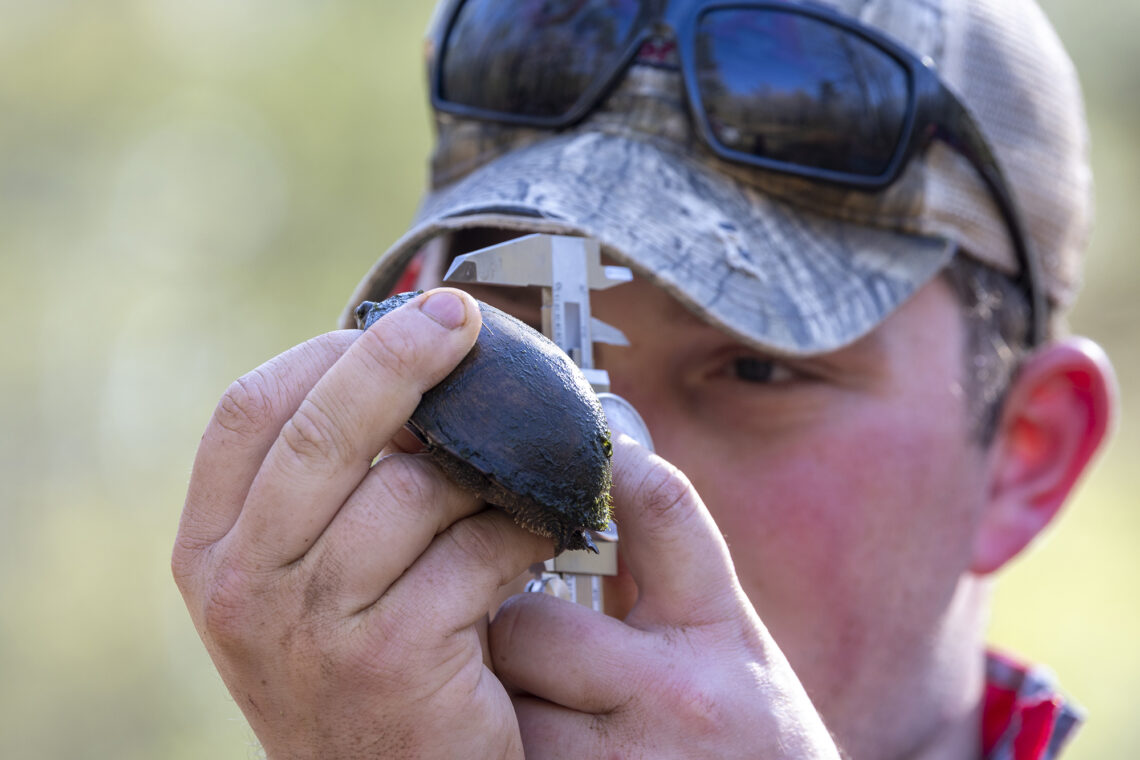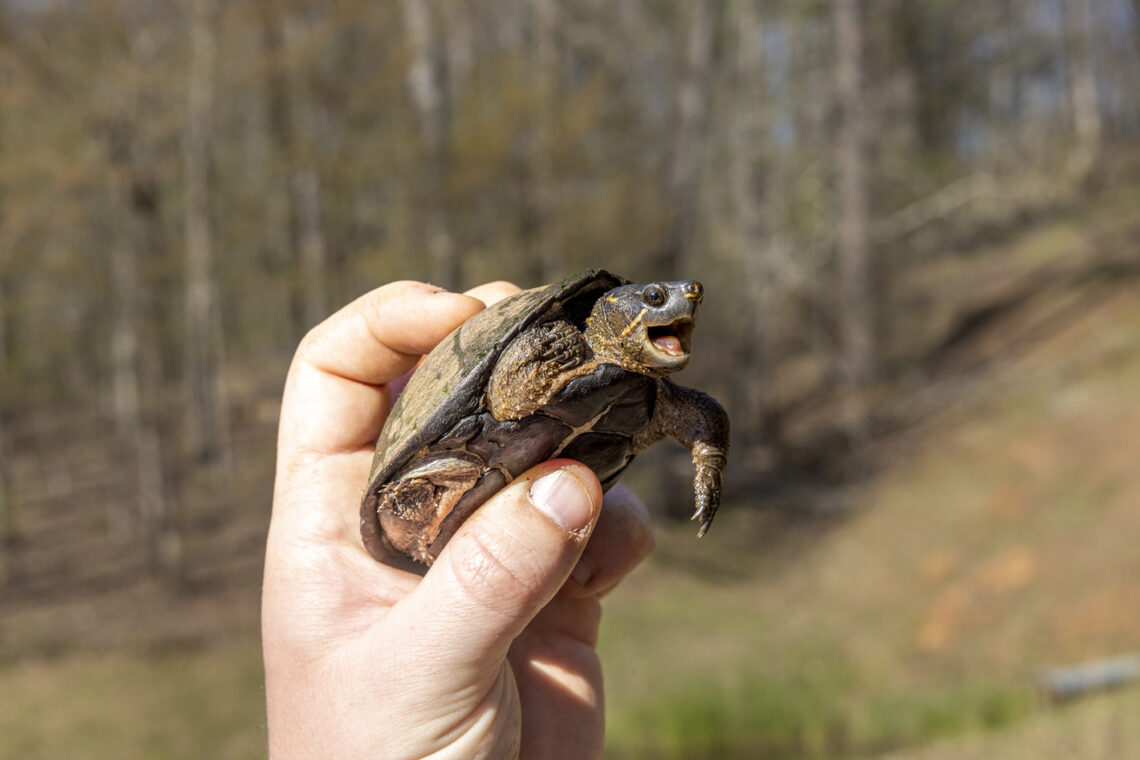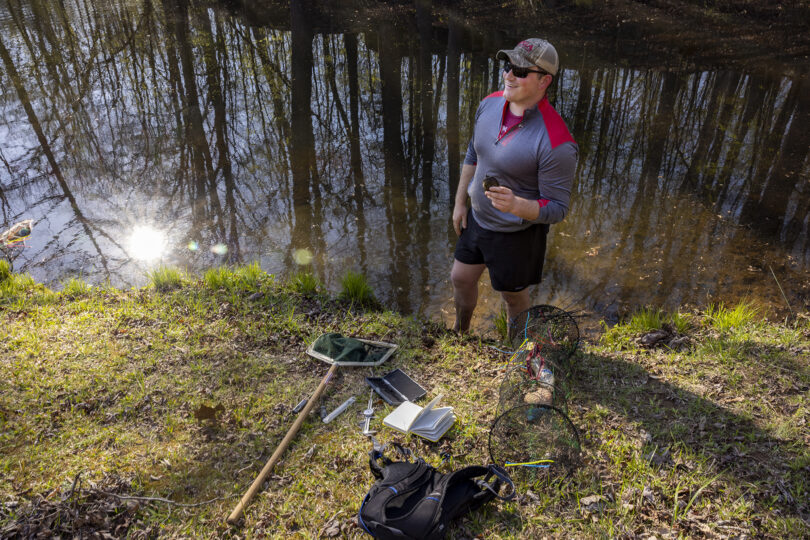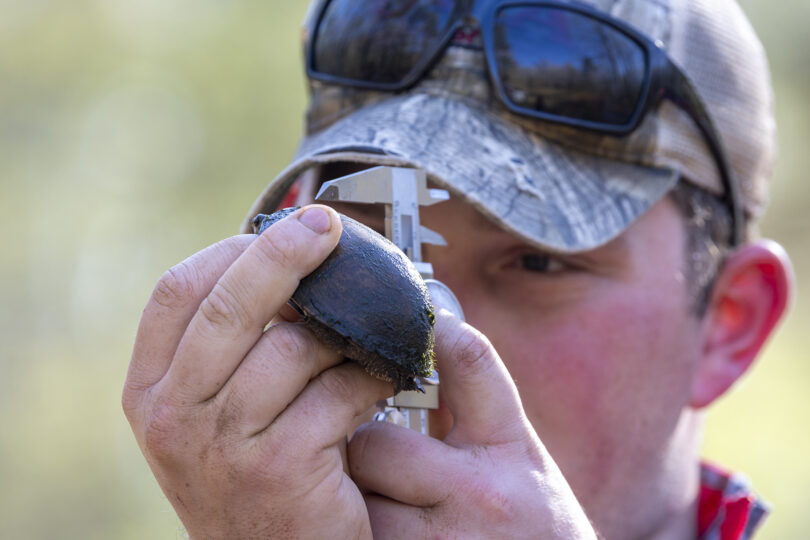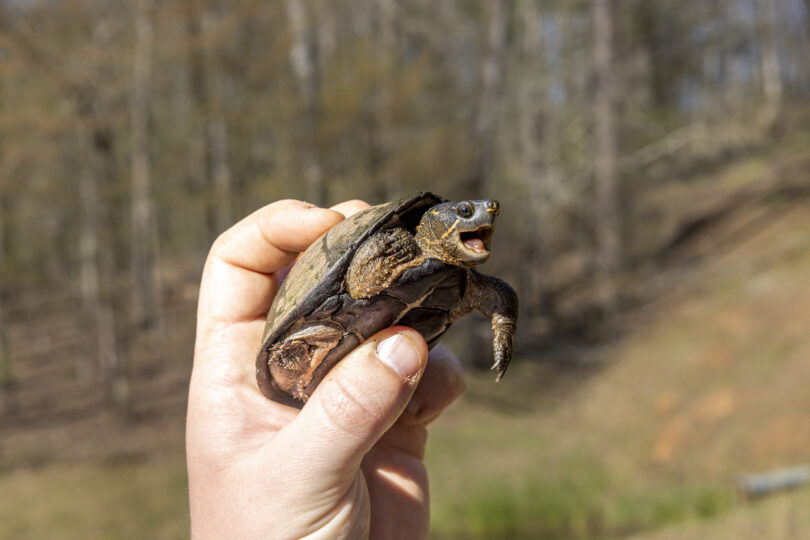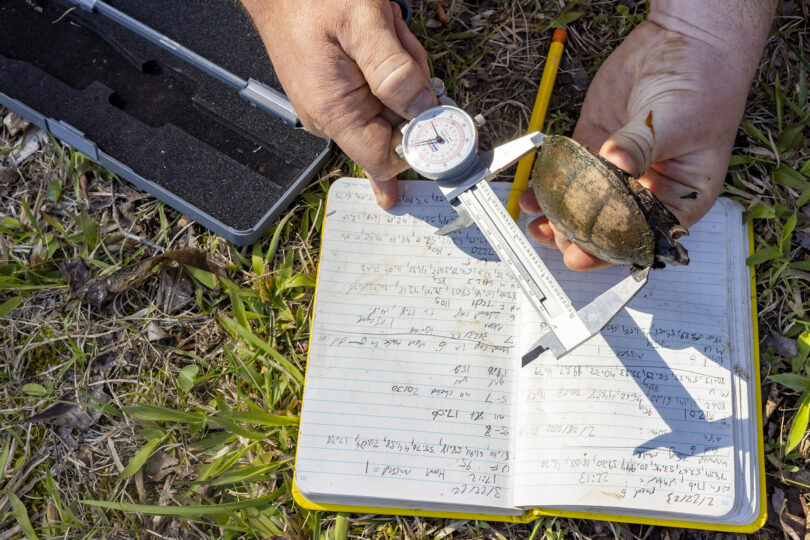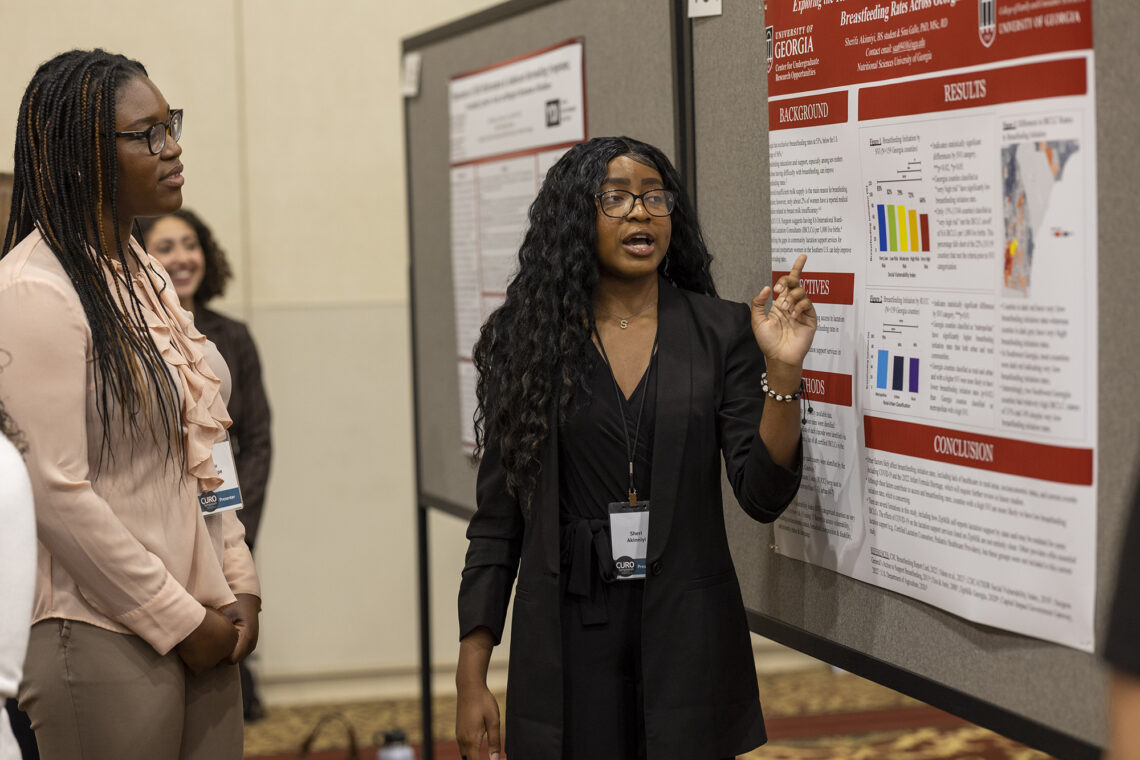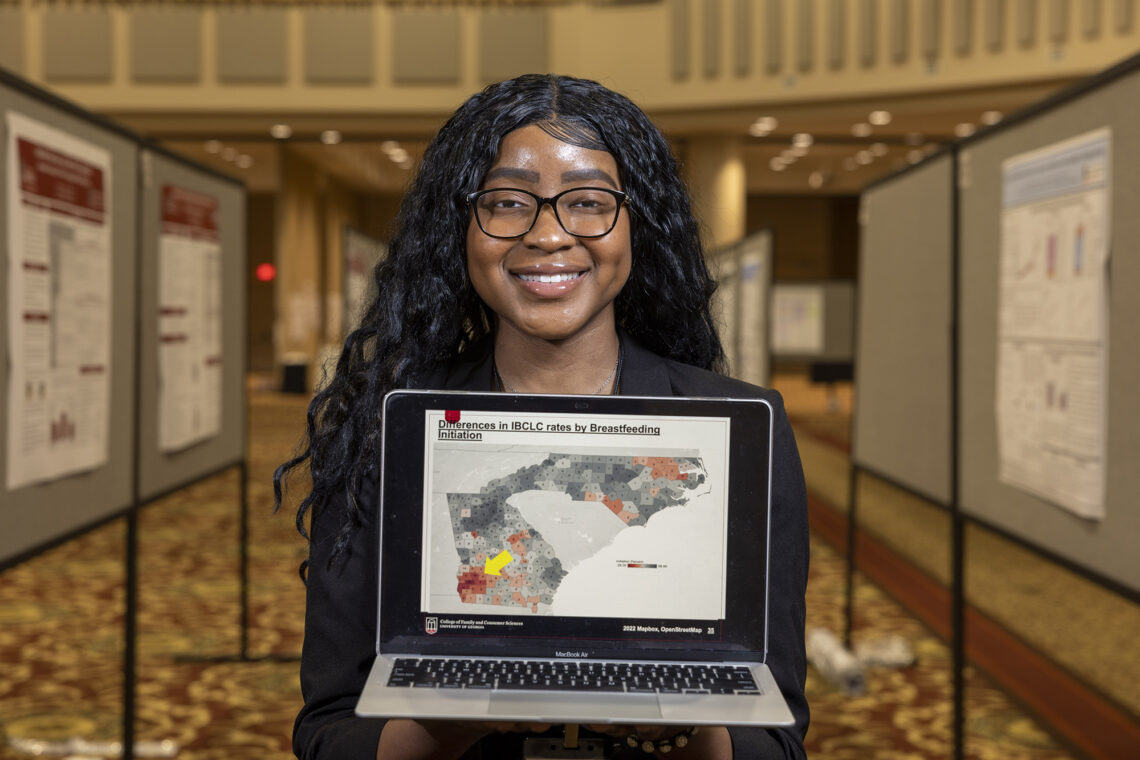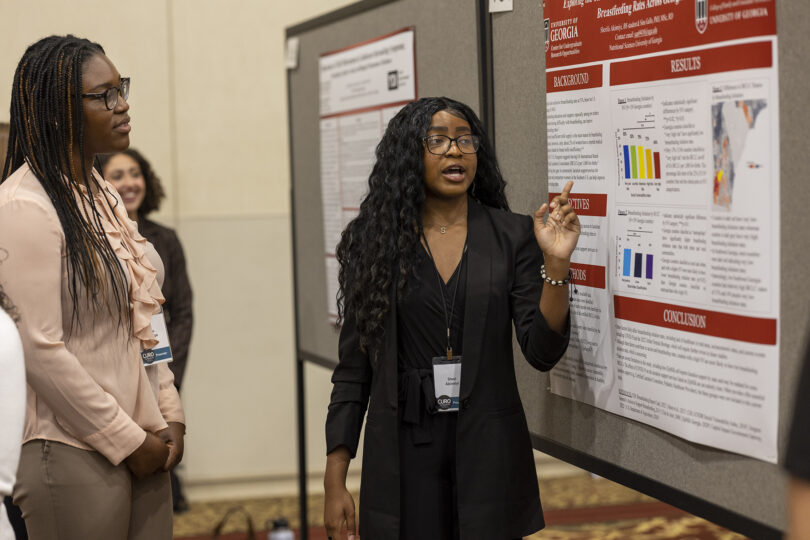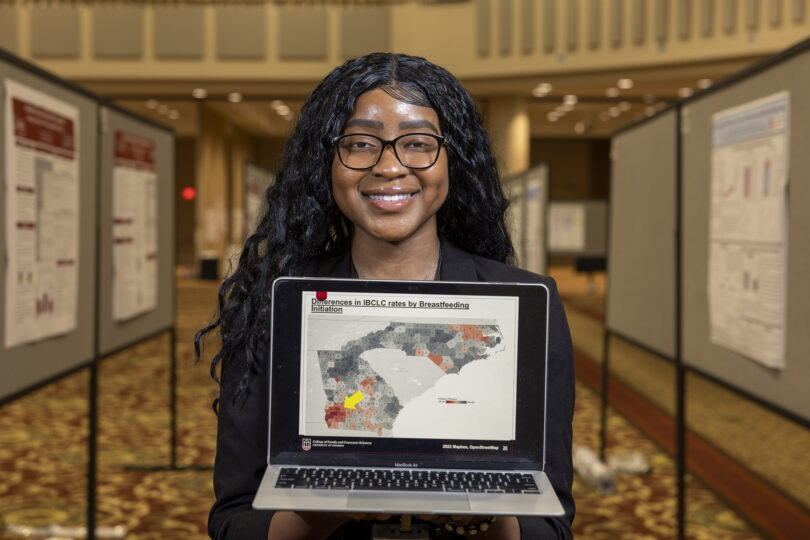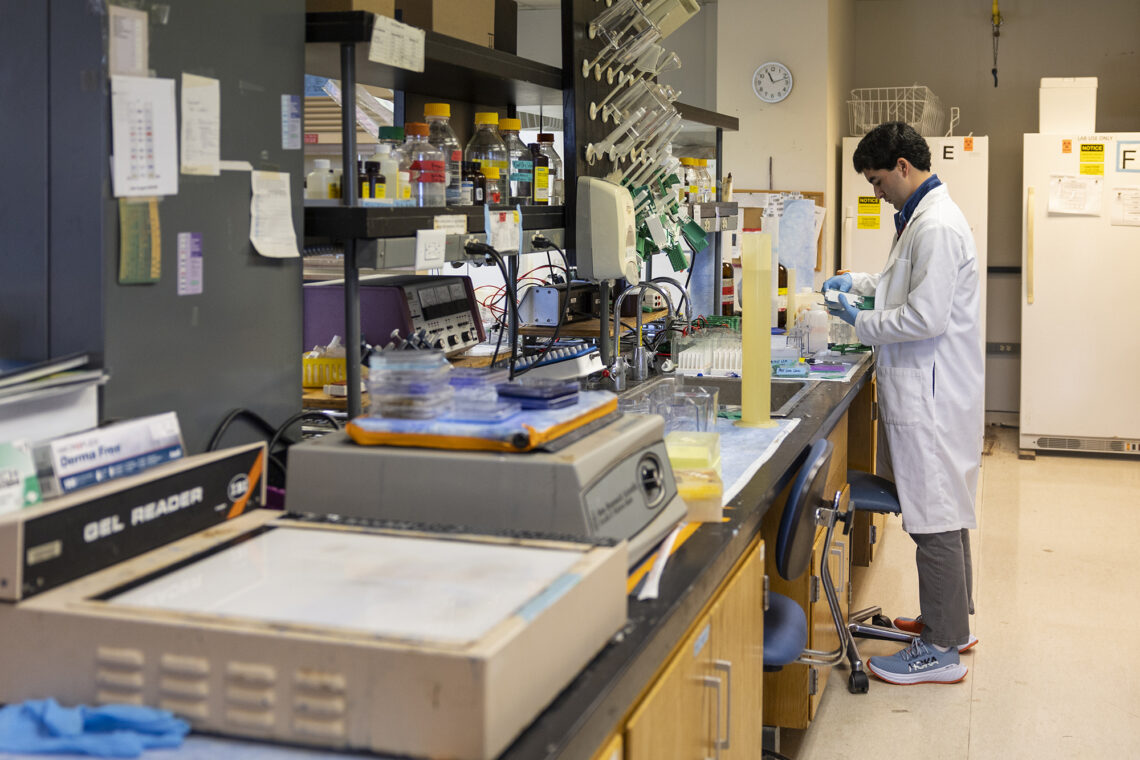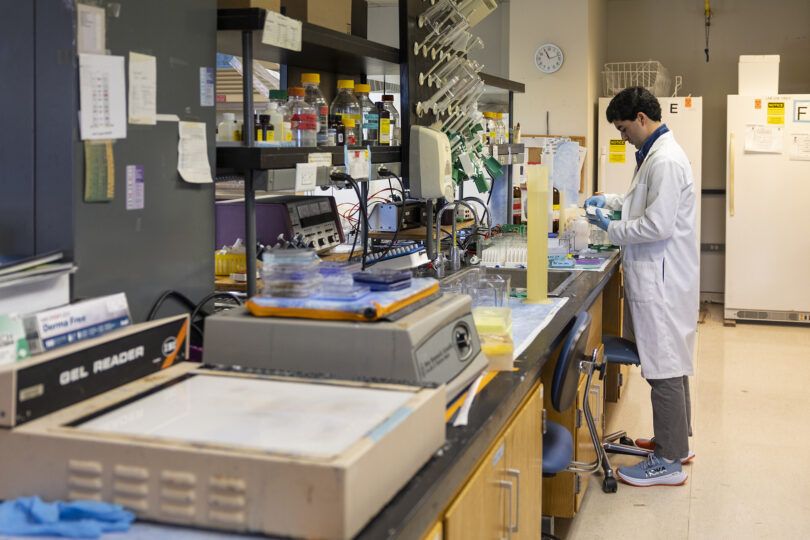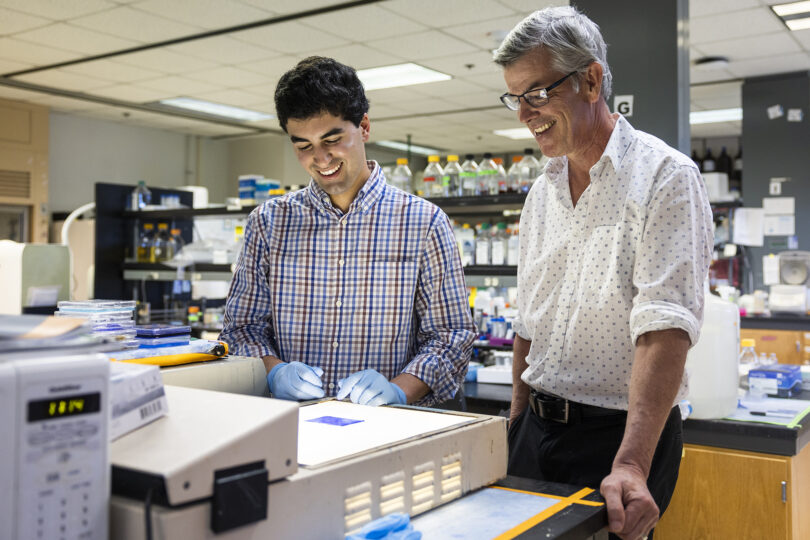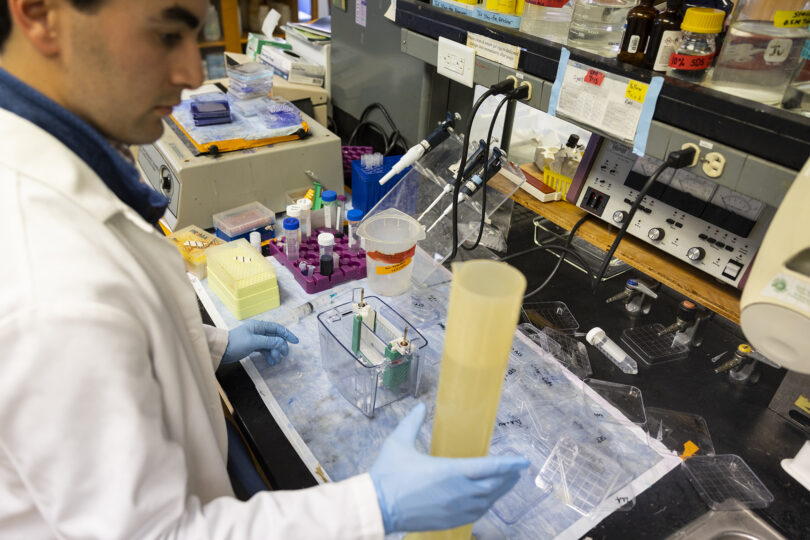Exploring a lifelong passion. Discovering a potential career path. Building new knowledge.
These are opportunities that college can present to any undergraduate, but for the University of Georgia students participating in CURO, they do it all through research.
CURO—the Center for Undergraduate Research Opportunities—connects students with research opportunities across campus. It is open to all undergraduate students, no matter their major, year, or level of research background. As long as participating students are ready to embrace intellectual curiosity, explore new topics, and even travel the country, CURO can enhance their undergraduate experience.
And for some CURO students, research proves lifechanging.
Séamus O’Brien, Senior
Senior fisheries and wildlife major from Dublin, Ireland
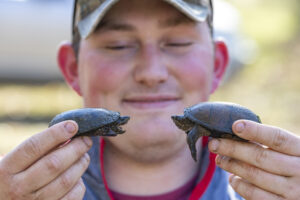
Seamus O’Brien holds two common musk turtles, one female and one male to compare their size and characteristics. (Photo by Dorothy Kozlowski/UGA)
Séamus O’Brien is studying the common musk turtle, a species that he (affectionately) refers to as small, stinky, and “kind of drab.”
He’s not that far off. The turtle’s scientific name, Sternotherus odoratus, reflects the species’ distinct smell, and their dark coloration makes them appear nondescript next to other species. Common musk turtles walk along the bottom of rivers rather than basking in the sun. So for most of us, they are out of sight and out of mind.
But O’Brien wants us to know more.
“Where the common musk turtle gets really important is there are a lot of them, and they’re something we don’t study a lot in the scientific community,” O’Brien says. “A lot of times, we shine a light on things that are really rare, cryptic, or endangered, and we can neglect some more common animals that impact our day-to-day lives and the areas where we recreate, fish, and do other things.”
O’Brien catches common musk turtles; catalogs their weight, sex, and physical characteristics; and releases them back into their environment. He has caught hundreds of turtles and detected trends in their physical appearance and population in different areas. For example, musk turtles in the manmade ponds of Whitehall Forest, south of Athens, are smaller than their peers in naturally occurring wetlands. This data creates a foundation for future research on the musk turtle’s diet, habitat conservation, and more.
As a CURO Summer Fellow, O’Brien works with mentor John Maerz, a distinguished professor in the Warnell School of Forestry and Natural Resources. Maerz specializes in animal ecology, evolution, and conservation management, and his lab is a home base for O’Brien’s research. But funding through CURO filled important gaps, enabling O’Brien to purchase traps and materials necessary for the scope of his project.
CURO also afforded networking opportunities that led to O’Brien’s next step: Graduate research with musk turtle expert Grover Brown at Jacksonville State University in Alabama. He will study the flattened musk turtle, a federally threatened species under the endangered species act.
“This wouldn’t be possible without CURO,” O’Brien said. “Doing this allowed me to meet the professor who will allow me to essentially pursue my dreams.”
Sherifa Akinniyi
Senior nutritional sciences major from Lithonia, Georgia
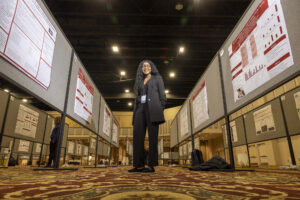
Sherifa Akinniyi studied lactation support services and breastfeeding rates across Georgia. Her data is a first step in building improved resources across the state. (Photo by Peter Frey/UGA)
Sherifa Akinniyi saw the impact of nutritional sciences first-hand in high school when her mom faced several health complications.
“We didn’t have a physician or someone I could turn to for more information on obesity or hypertension,” she says. “I had to look up a lot of information myself through the NIH, CDC, and scientific papers. That was the first time I really did extensive research.”
She used that research from the National Institutes of Health and Centers for Disease Control and Prevention to establish a dietary plan, and her mother’s health improved. It also set her on a path forward at UGA.
“When I applied to UGA, one of the big things for me was determining what major would capture my personal experience and my interests,” Akinniyi says. “I didn’t want to go the conventional route as a pre-med student, and after meeting with the Department of Nutritional Sciences, I knew this was the right path.”
She found faculty mentor Sina Gallo, an associate professor and clinician-scientist in the College of Family and Consumer Sciences, and chose to study lactation support services and breastfeeding rates across Georgia. The topic combined her knowledge in statistics with her interest in minority health and health disparities.
Through CURO and funding from the Peach State Louis Stokes Alliance for Minority Participation, she examined the state’s lactation resources, as well as their accessibility and utilization across communities.
“My biggest goal was to provide a visual of what’s going on with Georgia,” she says. “I can spit out all of these facts and provide all of this math, but the whole point is to reach an audience: Georgia citizens and health care providers. I want the public to understand what I’m talking about.”
In addition to data collection graphing where resources are utilized and categorizing potential obstacles to access, Akinniyi built a map of existing resources and the factors that impact their effectiveness.
“Research is never really complete, but this data is a great way to see what’s going on. We see trends, and that data is the catalyst for more knowledge,” she says.
Emilio Ferrara
Junior biochemistry and molecular biology major from Atlanta, Georgia
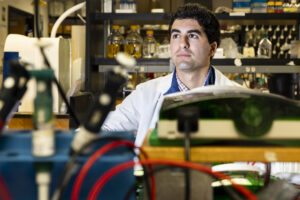
Emilio Ferrara studies Type IV CRISPR systems as part of his CURO program. Just as the human immune system fights off new bacteria or diseases, CRISPR fights off viruses attacking a bacterium. (Photo by Chamberlain Smith/UGA)
Emilio Ferrara did not realize it at first, but his experience with CURO led to a whole new career path. When you hear the title, “Elucidating the Structure & Function of Type IV CRISPR Systems,” it might seem indecipherable. But as a biochemistry and molecular biology major, as well as a Foundation Fellow, Stamps Scholar, and 2023 Goldwater Scholar in the Jere W. Morehead Honors College, Ferrara sees the complex topic as a first step toward transforming patient care.
“Some of the questions I have been wrestling with the more I dig into scientific research are: How can these discoveries make a difference for patients? What does it take to move from the bench side to the bed side?” Ferrara says.
Just as the human immune system fights off new bacteria or diseases, CRISPR fights off viruses attacking a bacterium. And not much is known about Type IV CRISPR systems. They have some of the rarest structures, but relate back to plasmids—single-strand DNA that can transfer DNA from one cell to another.
“Other than that, our knowledge of Type IV systems is essentially a blank slate,” says Ferrara, who works with faculty mentor Michael Terns, a Regents’ Professor in the Franklin College of Arts and Sciences. “This research is working to understand how the system is structured and how that structure corresponds to function—what kind of protection does it give bacteria and how does it work as an immune system?”
Insights from this research are an early step in biotechnology, but one day they might translate to patient care, Ferrara says.
“Starting with scientific research here at UGA, I have begun to investigate the many steps involved in taking science and turning it into something tangible that can save or improve someone’s life,” Ferrara says. “As I came through CURO and my biochemistry courses, I found that I was less interested in physician-patient interactions and more interested in understanding the mechanisms that are driving diseases.”
As a result, his path shifted a bit, away from medical school and toward a Ph.D.
“CURO has absolutely helped me form that decision and become confident in my decision,” Ferrara says. “It exposed me to researchers all across campus, and it opened my eyes to a whole other area of science that I didn’t know existed. I realized you can get a Ph.D. in biomedical sciences or biochemistry and do really innovative research that could translate into potential new drugs to treat many diseases, possibly even cancer.”
Research Firsthand
Ireland Hayes, senior journalism major from Folkston, Georgia
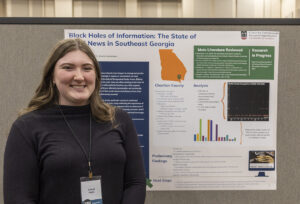
Ireland Hayes’ CURO research explores the lack of traditional news coverage in rural areas. (Photo by Peter Frey/UGA)
Misinformation is one of the biggest threats to modern journalism, and it often stems from a lack of access to accurate and verified information. Growing up in a rural county in Southeast Georgia, I experienced firsthand the detrimental effects loss of news coverage can have on a community. As local news outlets continue to disappear due to a lack of both funding and of journalists, communities like mine are having to fill in gaps in coverage through less-than-ideal means, often on online forums or Facebook pages, which opens them up to a much higher risk of consuming misinformation.
In my research project, “Black Holes of Information: The State of Local News in Southeast Georgia,” I developed a case study of Charlton County, Georgia, the community where I grew up, analyzing the lack of traditional news coverage experienced in rural areas.
CURO provided the opportunity for me to explore and hopefully find solutions to issues affecting my own community and gave me hands-on research experience that I hope to one day carry into graduate school or a career as a journalist myself. I have also traveled to research conferences, where I shared my research with other scholars from around the country. It was an opportunity I would have never had without the support of CURO.
My mentor Karin Assmann, assistant professor of journalism, has been an invaluable resource, guiding me through the research process from the initial brainstorm up to working on a research paper for publication. I entered her office with no formal training, but now after nearly two years working with her, I feel more than equipped and very excited to continue in the field of journalism research.~Ireland Hayes


